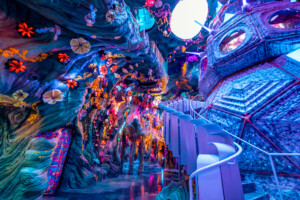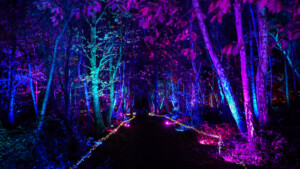Related: From One Expo to the Next, Transfer of Knowledge is Tricky to Achieve / Three Pavilions at Shanghai Expo 2010 / World Expo Time Capsule: Why the USA Pavilion at Shanghai Had Such a Difficult Path / Not an architectural handstand / USA Pavilion Groundbreaking in Shanghai
By Gordon Linden
Although the sight of a malfunctioning support column during the raising of the Olympic torch and the news of the tragic death of an athlete gave pause to many as the Vancouver Winter Olympics started, by the time the Closing Ceremonies were over, a few short hours after their team had narrowly beat the US in hockey, the national sport of Canada, it was obvious that the City had pulled off another triumphant effort in staging a megaproject.
Twenty-four years ago, Vancouver hosted Expo ’86 which is considered one of the best of the Category II Specialized expositions sanctioned by the BIE. Expo ’86 had over 100 international and domestic exhibitors and other attractions which were developed on a spectacular riverfront site which had only months prior been occupied by numerous sawmills in varying stages of disrepair. Attendance at Expo ‘86 reached 22 million against a forecast of 18 million, testimony to the high level of public support and interest in the event. After the Expo, the site was sold to a Hong Kong developer and high rise development and parks have been built with more planned for the future.
Vancouver’s Winter Olympics benefited from several of the legacy projects of Expo ’86. BC Place, where Opening, Closing and Victory ceremonies were held, was built in the run up to Expo ’86 and utilized during the event for entertainment and ceremonial presentations. The iconic Preview Center globe built for the Expo has been transformed into the Telus World of Science which was temporarily occupied in February by the organizers of the next Winter Olympics – Sochi, Russia. The City’s elevated rail system, Skytrain, was a key part of Expo ’86, linking the main site with the Canadian Pavilion and passenger cruise ship terminal; the system was further expanded for the Games with a new link to the Richmond Skating Oval.
But the megaevents are only a part of the bigger story of Vancouver’s success at creating a livable, vibrant and sustainable community. While most downtown areas in major cities in North America are abandoned at night as workers make the trek to the suburbs, Vancouver’s downtown streets are bustling with people, many of whom live in the highrises nearby. Not unexpectedly, Vancouver’s city planners are now being sought to provide advice to other cities on how to achieve the type of development which is on display there.
It is noteworthy that another Canadian city – Montreal – has also played host to both an International Exposition (’67) and the Summer Olympics (’76). While Montreal’s story is different in many ways, Canada has shown that mega-events can be an important vehicle in furthering urban development agendas and garnering international attention. Later this year, the city of Edmonton, Canada is expected to become Canada’s candidate to host Expo 2017; Edmonton plans to turn its Expo site into a University campus, a first in legacy planning for an Expo. Nearby Calgary hosted the Winter Olympics in 1988. With that in mind, is Canada poised for a “three-peat”?
Gordon Linden AIA, AICP (www.gordonlinden.com) is Manager of Planning and Urban Design with Parsons International, based in Dubai, UAE where he has responsibility for directing the planning of a variety of mega-projects in the Middle East. During his career, he has worked on numerous one-time events, including Olympic Games and International Expositions. Recently he has been part of a team assisting Edmonton, Canada in assessing the potentials for hosting a future expo, and was featured speaker at a business gathering in Shanghai to advise the Expo’s international exhibitors about the planning, operations and relocation of their pavilions. He is author of The Expo Book: A Guide to Planning, Organizing and Hosting World Expositions, published online at www.TheExpoBook.com.
Photos Courtsey of Gordon Linden: From top left
The Richmond Olympic Oval will become a multipurpose community recreational facility after the Games.
BC Place hosted the Opening and Closing Ceremonies as well as nightly Victory Ceremonies.
Downtown Vancouver hosted numerous free events which drew large crowds.










